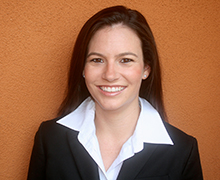Politics of disability

Politics of disability
- May 11, 2015
- Grad student studies the political behavior of Americans with disabilities
-----
As the country’s focus turns to the 2016 election and prospective Presidential candidates,
citizens and policy-makers are gearing up for the coming year’s political firestorm.
However, Americans with disabilities, deemed “the largest minority” by some, remain
on the outskirts of the voting public—and political science grad student Sierra Powell
wants to find out more.
Having recently been awarded a $10,000 Chancellors Club Fund for Excellence Fellowship,
Powell - who came to UCI after earning degrees in government and philosophy from the
University of Redlands - is on the cusp of completing her dissertation, which examines
the political engagement and preferences of Americans with disabilities.
A combination of education, personal interests and upbringing led Powell to her dissertation
topic, but her interest was truly piqued when she saw friends and colleagues studying
various racial and ethnic minority groups. After noticing a surprising lack of research
on citizens with disabilities in American politics, she decided to take the matter
into her own hands.
“My mom is a school psychologist and works with people with disabilities regularly,
and my father has always been very interested in politics, so I kind of view my dissertation
as a combination of some of the things my parents have brought to my life,” Powell
says.
However, to write a dissertation, you have to do something that nobody has done before,
Powell says, so she started looking at the literature to see what has been written
on people with disabilities and their political engagement in American politics.
“Ultimately, I discovered there were really only one or two people who were studying
the political behavior and preferences of people with disabilities,” she says. “So
for me it seemed like a ripe area for study, an area with a lot of potential.”
While the 2010 Census shows that the U.S. is home to more than 56.7 million people
with disabilities—making up more than 18 percent of the non-institutionalized population—voter
turnout rates for this demographic are historically low. However, as Powell describes
in her dissertation, this group does not experience low political engagement in all
areas.
She notes that while she found that voter turnout and overall political knowledge
of the group to be low, she was surprised to find that they were, in fact, relatively
the same as the non-disabled population in terms of news attentiveness and experiencing
an overall interest in politics.
“So it seems that voting is a unique case, by and large, of political engagement for
people with disabilities,” she explains. “One surprising finding was that people with
disabilities are more likely than people without disabilities to contact members of
Congress.”
While there is no concrete answer as to why this group hasn’t been studied more extensively,
Powell believes that it is in large part due to the population being difficult to
access.
“It’s a tough population to identify,” she shares. “A lot of people experience such
extreme disability that they cannot respond to surveys. There is also a large segment
of the population of people with disabilities that is incarcerated, and those people
are really difficult to reach.”
In addition, this seems to be a group that suffers the same lack of involvement from
political parties as young people. Because they do not show up at the polls - typically
20 percent less than citizens without disabilities - they generally aren’t targeted
by groups working to mobilize voters.
“It’s this kind of vicious cycle where they don’t come out [to vote] so they’re not
targeted to a great extent. But, maybe if they were targeted more explicitly, they
would come out.”
However, after finding that individuals who identify as having a disability are more
likely to align themselves with the Democratic party, Powell believes that it could
be well worth the effort for political parties to reach out to this particular demographic
for votes and support. And with a presidential election on the horizon, her study
is particularly timely.
As Powell parses through her research and prepares to defend her dissertation this
month, she hopes that her findings will encourage other researchers to account for
the behavior of people with disabilities in their analyses of American politics. She
also hopes it will serve as a step toward an American political system more inclusive
of people with disabilities. For her part, she will be authoring a book chapter this
summer based on her findings, and hopes to continue her studies in academia. Wherever
she goes from here, she says she is very proud of and passionate about her research.
“I think it is very sad that people with disabilities are not voting at the same level
and that they are not researched as extensively as other minority groups,” Powell
says. “I am glad to have spent my time at UC Irvine on a topic that is meaningful—something
that could make the world a better place.”
—Bria Balliet, School of Social Sciences
-----
Would you like to get more involved with the social sciences? Email us at communications@socsci.uci.edu to connect.
Share on:
Related News Items
- Careet RightReady for takeoff
- Careet RightUC Irvine political science faculty statement on the events of Jan. 6, 2021
- Careet RightHundreds of political scientists call for removing Trump
- Careet RightThe midterms could spell the end for America's lonely moderates
- Careet RightIf it walks like a social movement and talks like a social movement...


